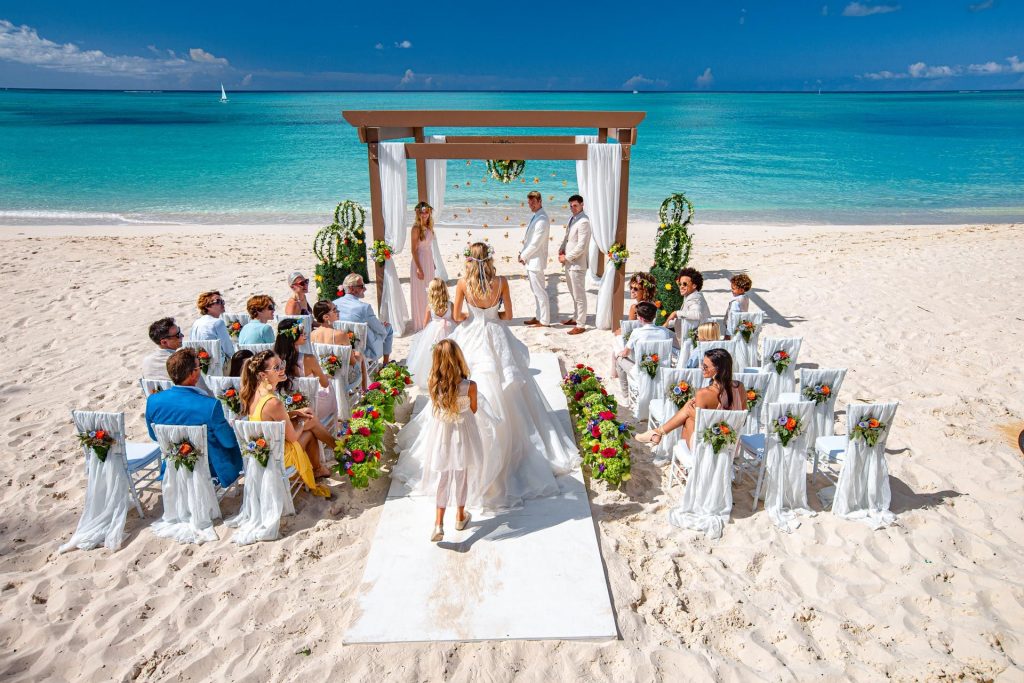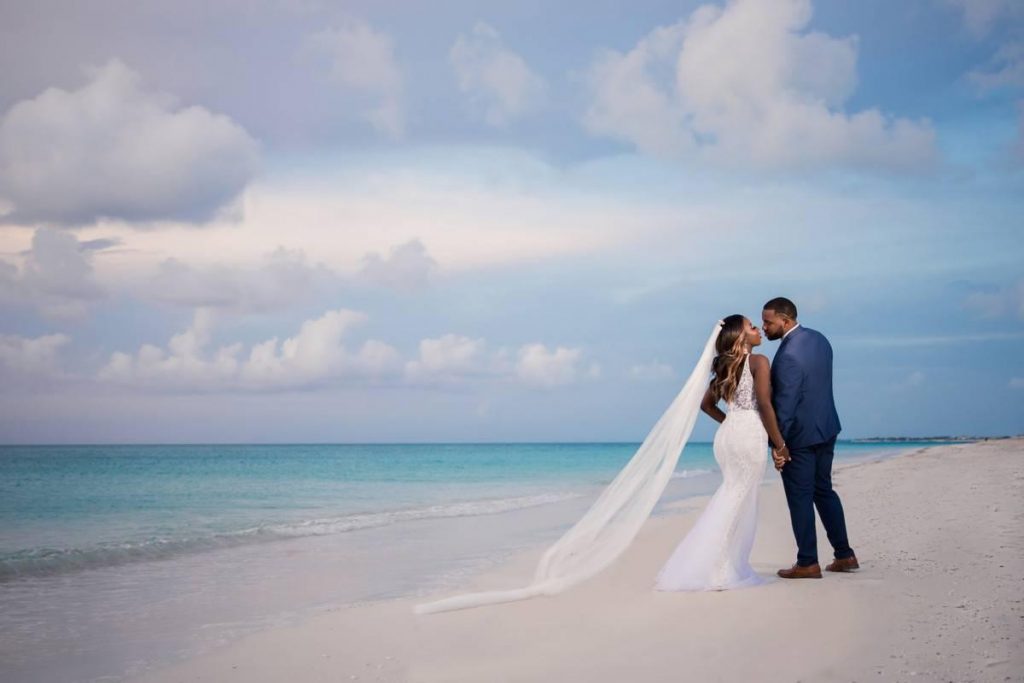Are you considering a destination wedding? In this article, we will discuss the benefits of choosing a destination wedding and what you can expect throughout the planning process. Whether you’re on the fence about flying private or just curious about the world of business jet charters, this blog will provide you with valuable information and insights. By the end of this article, you will have a better understanding of why destination weddings are becoming increasingly popular and how they can make your special day truly memorable.

This image is property of www.brides.com.
Destination Weddings
Destination weddings have become increasingly popular in recent years, offering couples a unique and memorable way to exchange vows. Rather than having a traditional wedding close to home, destination weddings allow you to get married in a picturesque location of your choice, while also providing the opportunity for a mini vacation for you and your guests. In this article, we will explore the definition of destination weddings, popular destinations for such weddings, and the advantages they offer. We will also discuss the factors to consider when planning a destination wedding, how to choose the perfect destination, and the necessary arrangements for travel and accommodations for guests. Additionally, we will provide tips on hiring wedding vendors, planning the wedding itinerary, ensuring a smooth wedding ceremony, and handling legal and administrative considerations. Finally, we will touch on guest etiquette, budgeting tips, guidelines for wedding dress and attire, and capturing memorable moments during destination weddings.
Definition of Destination Weddings
A destination wedding is a unique and increasingly popular way for couples to tie the knot. It involves hosting the wedding ceremony and reception in a location away from the couple’s hometown or residence. These weddings often take place in exotic or picturesque destinations, such as tropical resorts, beachfront locations, vineyards, or historical landmarks. Destination weddings offer a more personalized and intimate experience, allowing couples to celebrate their special day in a location that holds significance for them or offers a stunning backdrop for their wedding festivities.
Popular Destinations for Destination Weddings
When it comes to selecting a destination for your wedding, the options are virtually endless. Popular choices for destination weddings include tropical destinations like Hawaii, the Caribbean, and Bali, where couples can exchange vows on pristine beaches. European countries such as Italy, France, and Greece are also favored for their romantic charm and rich cultural heritage. Additionally, vineyards in California’s Napa Valley or South Africa’s Cape Winelands provide a unique setting for a wedding surrounded by rolling hills and stunning landscapes. These destinations are just a few examples of the many options available, each offering its own unique charm and appeal.
Advantages of Destination Weddings
Destination weddings offer a range of advantages that make them an appealing choice for couples seeking a unique and memorable wedding experience. Here are some of the advantages:
Unique and Picturesque Venues
One of the primary advantages of destination weddings is the opportunity to host your wedding in a unique and picturesque venue. Whether it’s a secluded beach, a charming countryside villa, or a majestic castle, destination weddings offer a wide range of venue options that can’t be replicated in a traditional hometown wedding. These venues provide a stunning backdrop for your special day, creating a memorable experience for both you and your guests.
All-inclusive Packages
Many destination wedding venues offer all-inclusive packages that simplify the planning process. These packages often include accommodation for the couple and their guests, catering services, wedding coordination, and various additional amenities. These packages can help alleviate some of the stress associated with planning a wedding, allowing you to focus on enjoying your special day.
Opportunity for a Mini Vacation
Hosting a destination wedding not only provides a unique wedding experience but also offers the opportunity for a mini vacation for you and your guests. By choosing a destination that offers a range of activities, such as snorkeling, hiking, or exploring local attractions, you can create an unforgettable experience for everyone involved. This allows your guests to not only celebrate your special day but also enjoy a memorable vacation in a beautiful location.

This image is property of www.sandals.com.
Factors to Consider when Planning Destination Weddings
While destination weddings can be a dream come true, they also require careful planning and consideration. Here are some important factors to consider when planning your destination wedding:
Budget and Cost Considerations
Before embarking on the planning process, it’s crucial to establish a budget for your destination wedding. Consider all the necessary expenses, including travel costs, accommodations, venue rental, catering services, wedding attire, and any additional activities or events. It’s essential to ensure that your desired destination and venue are within your budget, as costs can vary significantly depending on the location and the services you require.
Legal Requirements and Marriage Licenses
Different countries and locations have their own set of legal requirements for getting married, including marriage licenses, documentation, and waiting periods. It’s important to research and understand the legal requirements of your chosen destination to ensure a smooth and legally recognized wedding ceremony. Consulting with a local wedding planner or legal professional can provide you with the necessary guidance to meet all the legal obligations.
Guest Accommodations and Logistics
When planning a destination wedding, it’s important to consider the accommodations and logistics for your guests. Ensure that there are suitable accommodation options available near your chosen venue, ranging from luxury resorts to more affordable options, to accommodate all your guests’ preferences and budgets. Additionally, consider arranging transportation options to help your guests navigate the destination and attend various wedding-related events.
Choosing the Perfect Destination for Your Wedding
Choosing the perfect destination for your wedding is a crucial decision that sets the tone for your entire wedding experience. Here are some factors to consider when selecting your wedding destination:
Researching Different Locations
Start by researching different locations that align with your vision for your wedding. Consider factors such as the scenery, climate, local culture, and available venues. Look for destinations that offer the ambiance and aesthetic you desire, whether it’s a tropical paradise, a historical city, or a breathtaking natural landscape. Online resources, travel guides, and recommendations from friends or wedding professionals can help you narrow down your options.
Considering the Climate and Weather
The climate and weather of your chosen destination are important factors to consider, especially if you have a specific season or time of year in mind for your wedding. Research the typical weather patterns and seasonal variations to ensure that the climate aligns with your preferences. You’ll want to choose a time of year when the weather is typically pleasant and conducive to outdoor celebrations.
Assessing Travel Accessibility
Consider the travel accessibility of your chosen destination, both for you and your guests. Look for direct flights or convenient connections to make the travel process smoother. Unlike local weddings, destination weddings require additional travel arrangements, so it’s essential to choose a location that is easily accessible and doesn’t involve excessively long or complicated journeys for you and your guests.

This image is property of cdn0.weddingwire.com.
Arranging Travel and Accommodations for Guests
When hosting a destination wedding, it’s important to assist your guests with their travel and accommodation arrangements. Here are some tips to make the process easier for everyone involved:
Coordinating Group Flights
To make travel arrangements more convenient for your guests, consider coordinating group flights or providing them with a list of recommended flights and airlines. This can help guests coordinate their travel plans and possibly secure group discounts. Additionally, consider organizing airport transfers to assist guests in reaching their accommodations seamlessly.
Booking Hotel Accommodations
To streamline the process for your guests, consider reserving a block of hotel rooms at one or more accommodations near your chosen venue. Negotiate group rates and work with the hotel staff to ensure a smooth booking process for your guests. Providing a range of accommodation options, from luxury resorts to more budget-friendly hotels, can cater to different guest preferences and budgets.
Providing Transportation Options
To make it easier for your guests to navigate the destination, consider arranging transportation options such as shuttles or private transfers. This can help alleviate any stress associated with finding their way around an unfamiliar location, ensuring that everyone can attend the various wedding events and festivities.
Hiring Wedding Vendors for Destination Weddings
Finding and hiring reliable vendors is a crucial aspect of planning any wedding, and it becomes even more important when planning a destination wedding. Here are some tips for hiring vendors for your destination wedding:
Finding Local Vendors
When planning a destination wedding, it’s often beneficial to hire local vendors who are familiar with the area and have experience in catering to destination weddings. Local vendors can provide valuable insights and recommendations, and they are often well-equipped to handle the logistics of working in an unfamiliar location.
Managing Communication and Contracts
As you’ll likely be planning your wedding from a distance, effective communication with your vendors is crucial. Opt for vendors who are responsive, professional, and fluent in your preferred language. Clear communication and prompt responses can help ensure that your vision is understood and executed accurately. Additionally, ensure that contracts are thorough and outline all the services, fees, and terms and conditions to protect all parties involved.
Arranging Site Visits and Tastings
While it may not always be feasible to visit your chosen destination multiple times during the planning process, try to schedule at least one site visit before your wedding. This allows you to meet with your vendors in person, discuss the details of your wedding, and view the potential venues. If possible, organize tastings for the catering and cake vendors to ensure that the food reflects your tastes and preferences.
This image is property of services.travelsavers.com.
Planning the Wedding Itinerary
Creating a well-organized itinerary is key to ensure that your destination wedding runs smoothly. Here are some considerations for planning your wedding itinerary:
Scheduling Pre-Wedding Activities
Consider scheduling pre-wedding activities and events to provide an enjoyable experience for your guests leading up to the wedding day. These may include welcome parties, group excursions, or rehearsal dinners. Pre-wedding activities allow guests to bond and mingle, ensuring a festive atmosphere throughout the celebration.
Organizing the Wedding Day Timeline
Create a detailed timeline for your wedding day, incorporating all the necessary events, such as the ceremony, cocktail hour, dinner, and reception. Ensure that there is ample time for each segment of the wedding, including time for photographs, speeches, and dancing. Share the timeline with your wedding party and vendors to ensure everyone is on the same page and can execute the plan seamlessly.
Coordinating Post-Wedding Celebrations
Destination weddings often extend beyond the wedding day itself, offering the opportunity for post-wedding celebrations. Consider organizing farewell brunches, day-after activities, or additional gatherings to continue the celebration and bid farewell to your guests in style. This allows for a more relaxed and prolonged wedding experience, creating lasting memories for all.
Ensuring a Smooth Wedding Ceremony
Planning a wedding ceremony in an unfamiliar location can present its challenges. However, with careful preparation and the assistance of local professionals, you can ensure a smooth and memorable ceremony. Here are some tips:
Working with a Local Wedding Planner
Engage the services of a local wedding planner who is familiar with the destination and has experience coordinating weddings in the area. A local wedding planner can provide invaluable guidance, recommend reliable vendors, and oversee the logistics of your wedding day, ensuring that everything runs smoothly.
Dealing with Language and Cultural Barriers
If you’re hosting your wedding in a location where the local language and culture differ from your own, it’s important to consider any potential language or cultural barriers. Ensure that there is effective communication between yourself, your guests, and your vendors. Consider hiring interpreters or ensuring that bilingual staff are available if needed. Additionally, familiarize yourself with local customs and traditions to ensure that your wedding respects and incorporates elements of the local culture.
Preparing for Unexpected Challenges
No matter how meticulously you plan, unexpected challenges can arise during a destination wedding. Be prepared to adapt and be flexible in your approach. Consider having backup plans for outdoor ceremonies in case of inclement weather and anticipate any potential logistical issues that may arise due to the location. Remain calm and remember that the most important part of your wedding day is celebrating your love, no matter the circumstances.

This image is property of www.sandals.com.
Legal and Administrative Considerations for Destination Weddings
Planning a destination wedding involves navigating legal requirements and obtaining necessary permits and licenses. Here are some legal and administrative considerations to keep in mind:
Understanding Marriage Requirements in Different Countries
Different countries have varying requirements for legal marriage ceremonies. Some may require specific documents, medical tests, or residency periods before granting a marriage license. It’s essential to research and understand the specific marriage requirements of your chosen destination to ensure that you meet all the legal obligations.
Obtaining Necessary Permits and Licenses
In addition to marriage licenses, some locations may require permits for hosting a wedding ceremony in a public space or at a particular venue. Ensure that you obtain any necessary permits and licenses well in advance to avoid any complications or legal issues.
Legalizing Marriage Documents
If you plan to have a legally recognized marriage in your home country, you may need to legalize your marriage documents obtained from a foreign country. This process typically involves having the documents translated and authenticated by the respective authorities in your home country. Research the specific requirements for legalizing foreign marriage documents to ensure that your marriage is legally recognized upon your return.
Guest Etiquette for Destination Weddings
When invited to a destination wedding, it’s important for guests to be mindful of certain etiquette guidelines. Here are some tips for being a considerate and respectful guest:
RSVPing and Providing Accurate Guest Count
As soon as you receive the wedding invitation, promptly RSVP and inform the couple of your attendance or non-attendance. It’s vital to provide an accurate guest count to help the couple make informed decisions regarding accommodation, seating arrangements, and other logistical considerations.
Respecting the Couple’s Wishes and Cultural Norms
Destination weddings often incorporate local customs, traditions, or cultural elements. Respect the couple’s wishes and any cultural norms associated with the chosen destination. Familiarize yourself with any specific dress codes, customs, or etiquette guidelines to ensure that you can fully participate and appreciate the wedding experience.
Offering Assistance with Travel Arrangements
If you have experience or knowledge of the destination, offer assistance to the couple or other guests who may be less familiar with the location. Share your insights, recommend activities or attractions, and provide tips for navigating the area. Your assistance can greatly contribute to the overall positive experience of the wedding for all attendees.
Destination Weddings Budgeting Tips
Destination weddings can be cost-effective, but also have the potential to become expensive. Here are some budgeting tips to help you plan your destination wedding more effectively:
Creating a Comprehensive Budget
Start by creating a comprehensive budget that includes all potential expenses, such as travel, accommodations, venue fees, catering, attire, decorations, and any additional activities or events. Be realistic about your budget and prioritize your expenses accordingly.
Prioritizing Wedding Expenses
Prioritize your wedding expenses based on your wedding vision and preferences. Determine which elements are most important to you and allocate a larger portion of your budget accordingly. This ensures that you can allocate funds to the elements that matter most to you, while potentially saving on less crucial aspects of the wedding.
Negotiating with Vendors for Cost Savings
When working with vendors, don’t be afraid to negotiate and inquire about potential cost savings. Depending on the destination and time of year, vendors may be open to offering discounts or special packages. Be proactive in your communication and explore different options to ensure that you are making the most of your budget.
Guidelines for Wedding Dress and Attire
Choosing the appropriate wedding dress and attire for a destination wedding is essential for comfort and practicality. Here are some guidelines to help you select the perfect attire:
Choosing Appropriate Attire for the Destination
Consider the climate and overall ambiance of your chosen destination when selecting your wedding attire. Opt for lightweight fabrics and styles that are suitable for the weather conditions. For example, a flowy chiffon dress would be more appropriate for a beach wedding, while a traditional ball gown may not be as practical.
Considering Climate and Practicality
Destination weddings often involve outdoor ceremonies or celebrations, so practicality is key when selecting your wedding attire. Choose attire that allows for movement and comfort, while also considering any potential weather conditions or outdoor elements.
Packing and Transporting Wedding Attire
If you’re traveling with your wedding attire, take precautions to ensure that it remains in pristine condition. Consider investing in a garment bag or carrying it on the plane as a personal item to minimize the chances of damage or wrinkling. Additionally, inquire with your hotel or venue about options for steaming or ironing the dress upon arrival.
Capturing Memorable Moments during Destination Weddings
Preserving the memories of your destination wedding is crucial, as it’s a unique and special experience. Here are some tips for capturing memorable moments:
Hiring a Professional Destination Wedding Photographer
Investing in a professional destination wedding photographer is a worthwhile expense. A professional photographer will have experience shooting in various locations, capturing the beauty of the destination, and ensuring that your precious moments are documented in a stunning and artistic manner.
Choosing Scenic Locations for Wedding Photos
Make the most of your destination by selecting scenic locations for your wedding photos. Research the area and consult with your photographer to identify the best spots for capturing the stunning beauty of your surroundings. Whether it’s a cliffside viewpoint, a lush garden, or a historic landmark, incorporating the destination’s unique features will add depth and beauty to your wedding album.
Preserving Memories Through Videography
Consider hiring a professional videographer to film your destination wedding. Videography allows you to relive the special moments, sounds, and emotions of your wedding day. A well-crafted wedding video can transport you back to the destination, enabling you to share the experience with loved ones who couldn’t attend the wedding.
Conclusion
Destination weddings offer couples the opportunity to create a unique and memorable wedding experience in a stunning location of their choice. From the breathtaking venues to the all-inclusive packages and the opportunity for a mini vacation, destination weddings provide a range of advantages. However, planning a destination wedding requires careful consideration of factors such as budget, legal requirements, guest accommodations, and vendor selection. By following these guidelines and seeking professional assistance when needed, you can ensure a smooth and unforgettable destination wedding experience.





